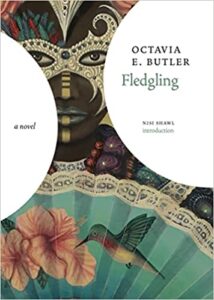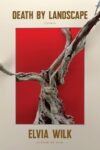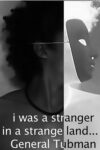
[Seven Stories Press; 2022]
“I don’t think I’m supposed to be alone,” the 53-year-old vampire of Octavia Butler’s Fledgling says to the man who she’s just bitten, sitting on his lap in the driver’s seat of his car, periodically lapping at the blood on his neck. She adds, “I don’t know who I should be with, though, because I can’t remember ever having been with anyone.” He’s the first human she speaks to — and bites — after reawakening alone, in pain, with no memory, and, though she doesn’t yet know it, living in the wake of catastrophic loss. Balanced against its sparse, simple delivery, this moment is threaded with an unnamed, not yet understood craving for connection that sets the course of Fledgling. Butler’s final novel traverses an expansive terrain: otherness, violence, the construction of belonging, and the complexity of grief. The book also returns to some of Butler’s perennial questions: how to assert power without weaponizing it, how to act with incomplete knowledge, and how to rebuild belonging in defiance of violent and destructive acts of exclusion.
Fledgling follows Shori, the vampire with no memory, as she slowly returns to an understanding of what she can do, who she is, and what she lost. In its first sentences, the novel makes Shori’s initial ignorance literal, as she returns to consciousness severed from a social world:
I awoke to darkness.
I was hungry — starving! — and I was in pain. There was nothing in my world but hunger and pain, no other people, no other time, no other feelings.
We learn later that Shori is the only survivor of her family, who were killed in a fire that left her near death and without memory. Left with “no other people, no other time, no other feelings,” she slowly regains footholds — remembering language, how to hunt, how to track scents and feed. But she also learns what she does not know and will not remember: the names of those she loved, the entirety of her life before, and the knowledge of her people, leaving her unable to even feel the loss as loss.
Any genre in the hands of Octavia Butler seems to unlock its boundaries, and her reworking of the vampire mythology is no exception. The vampires — known as Ina in the world of Fledgling — share many of the qualities associated with the figure: they drink blood, are strong and fast predators, and have extended lifespans. They are also fragile in their dependency on humans, their small population, and most of all, their precarity and futility in daylight.
The Ina’s role as predators in the world of Fledgling is anything but straightforward, however, as they live in tightly bound family structures in which each Ina has a devoted family of symbionts, or the collection of humans bound to them through the exchange of blood and venom. The novel twists common metaphors of vampirism to imagine the chemical, physiological, and emotional bonds that could form when one species lives off another, described as “mutualistic symbiosis.” This exchange creates attachments that are fulfilling to both — but also binding in that it results in a loss of self, free will, and independence. Butler imagines how relationships might form at the cellular level, in which the transfer of blood installs a chemical kinship. Shori learns this ability simultaneously with Wright (the man she bites) during the scene in the car, when she first learns that her blood produces a physical and psychological dependency in those she bites:
I wasn’t getting enough blood from his hand. I wanted to bite him again, but I didn’t want him afraid or angry. I didn’t know why I cared about that, but it seemed important. Also, I knew that hands weren’t as good for getting blood as wrists and throats were. I looked at him and saw that he was looking intently at me.
“It doesn’t hurt anymore,” he said. “It feels good. Which is weird. How do you do that?”
“I don’t know,” I told him. “You taste good.”
“Do I? He lifted me, squeezed past the division between the seats to my side of the car, and put me on his lap.
“Let me bite you again,” I whispered.
He smiled. “If I do, what will you let me do?”
I heard consent in his voice, and I hauled myself up and kissed the side of his neck, searching with my tongue and my nose for the largest blood source there. A moment later, I bit hard into the side of his neck.
This scene illustrates what Nisi Shawl astutely notes in her introduction: “[Shori] doesn’t know her power, yet she has no hesitation in using it. She is someone who learns her power by using it.” The complexity of this exchange is left unresolved, typical of the way that Butler leaves issues of morality in the novel productively tangled. The relationship inaugurated in this scene, like many in the book, holds the capacity to be both loving and fatal, both predatory and protective.
Perhaps the most crucial difference in the way Butler has refracted the vampire narrative, however, is that she takes the oft-used descriptor of paleness and makes it explicitly whiteness. The Ina in Fledgling are all white except for Shori. Her Blackness — as the circumstances surrounding the novel’s opening become clearer — proves to be the primary driver of the violence Shori experiences, as well as what saves and protects her. In a genre already rich with allegorical resonances to the construction of race, Butler’s novel positions Blackness as a means of survival, a way for a species rendered weak in daylight to walk in the sun, but at the same time, the reason she is excluded. When Shori reunites with her father, she learns she is the result of her family’s experiments to overcome this weakness through genetic engineering. He explains: “Some of us have tried for centuries to find ways to be less vulnerable during the day. Shori is our latest and most successful effort in that direction.” He also reveals that Shori is part human, with a Black human mother, a difference that ensures her survival: “the sun wouldn’t disable her at once,” he explains, because of “her dark skin.” It is on these grounds that Shori is excluded, feared, and rejected — because she is both. While Shori’s strength, power, and value are explicitly linked to her Blackness, the fact that these virtues are also a result of her humanity shows the intolerance of those who defy categories, as it continues to obstruct Shori’s attempts to reconstruct a family and identity. Butler thus nimbly opens the seams of the vampire figure to show the ways in which its mythology is already lined with implications about the construction of race, exclusion, and intolerance.
One of the great strengths of Fledgling is that Shori’s experience of loss is palpable in Butler’s masterfully simple writing. Her precise sentences tend to eschew embellishment or linguistic indulgences, but, though they appear straightforward, their emotional weight lands all the louder for how quietly they arrive. This is evident in a moment when Shori has to confront yet another loss: “It made no sense that she would be dead. None. Then I touched her cold flesh.” Butler is able to depict the complexity of emotion in even the sparsest of language. The single-word sentence, “none,” held almost as a shield against grief, cannot hold back the fact of death, as Shori’s denial is undone through her own senses, through the incontrovertible knowledge that comes through touch. The emphasis on the perceptible feeling of loss, its direct confrontation, brings into relief the losses she cannot remember, or properly feel.
As the world of the novel comes gradually into focus — from its beginnings in darkness, ignorance, and isolation to a society with a language, history, mythologies, and system of governance — we ultimately encounter a species as flawed as our own, with a justice system that is corrupted by social influence, and ultimately, in Shori’s case, not capable of delivering justice at all. Despite this, Fledgling ultimately proves hopeful, ending with a network of newly forged relationships, existing in chemical and emotional symbiosis. This is a quietly scary, utterly singular vampire novel that maps the relations between the human and extra-human at their most blurry edges.
Blair Johnson is a poet and PhD candidate in English at the University at Buffalo. Her poems have appeared in Boston Review, DIAGRAM, and Best American Experimental Writing.
This post may contain affiliate links.







